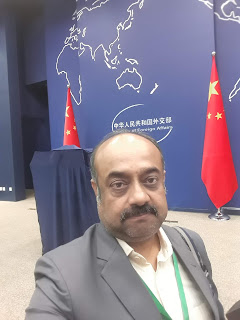Chinese economy is in 'challenging' situation, if not bad !!
Analysts point out Xi Jinping has made himself the country's 'leader for life', but it also true that since taking power in 2012, he has "successfully" cracked down hard on dissent, difference and debate as part of a drive to tighten Communist party control over all aspects of Chinese life.
This worked, and would continue to work had Xi delivered "prosperity" in exchange.
Earlier this month, China’s ability to repay its government borrowing has been downgraded by the credit rating agency Moody’s, which said the ripple effects from a crisis in the property sector would undermine efforts to revive its flagging economy.
The rating agency downgraded its outlook for Chinese sovereign bonds from stable to negative.
Moody’s warned that Beijing would need to bail out local and regional governments and state-owned enterprises that were struggling with rising debts, hampering efforts to boost investment and growth.
Lately there are certain developments within China and those could lead observers raise their eyebrows.
“What’s different today is that officials being neutralised are not members of hostile political factions but loyalists from the inner ring of Xi’s own clique, leading to serious questions over the regime’s stability,” one report claimed.
The subsequent death in October in a Shanghai swimming pool of Li Keqiang, a popular former prime minister and Xi rival, has intensified suspicions about a wider intrigue. Public tributes to China’s former premier Li Keqiang, who died a few months back, are being strictly controlled as the Chinese government wants a mass outpouring of grief that could lead to social unrest.
Li reportedly suffered a sudden heart attack in Shanghai and died. Li Keqiang addressing the eighth China-Japan Business Leader and Former High-Level Government Official Dialogue, November 2022. There have been public displays of grief, particularly in his home city of Hefei, in Anhui province, where hundreds of mourners laid flowers for one of their most significant social media is awash with tributes to Li, who was once seen as a force for economic liberalisation in the highest echelons.
Xi says there are “no limits” to his partnership with Russia’s Vladimir Putin. The US and the EU complain he is already assisting Moscow’s war effort by buying oil and supplying dual-use microchips and drones. Beijing often confronts American navy ships and planes in the Taiwan Strait. Did Xi decide to deniably flex his muscles in the Baltic, too, as a favour to a friend?
The whole thrust of Xi’s austere, almost puritanical leadership, indefinitely perpetuated by abolition of presidential term limits, has been to promote discipline, conformity, homogeneity and political unity in pursuit of his vision of 21st century Chinese global hegemony. Any suggestion his monolithic regime is cracking under internal strains is itself deeply destabilising – and therefore taboo.
Another recent incident, this time in international waters, has raised fresh doubts about Xi’s not-so-great helmsmanship. Normally cold-sober Finland last week made an extraordinary allegation: that a Chinese container ship deliberately sabotaged a Baltic Sea gas pipeline connecting it to Estonia. “I think everything indicates it was intentional,” Anders Adlercreutz, minister of European affairs, said.
Finland and Estonia are Nato members, at odds with Russia over Ukraine. The incident recalled the blowing-up of the Nord Stream pipelines between Russia and Germany last year. It also coincides with what Helsinki says is a Russian hybrid warfare operation along its border, where Moscow is in effect using asylum-seekers as weapons. - 'The Guardian'
His multiple domestic problems exacerbated by a growing backlash in Japan, South Korea, India, south-east Asia and the west to China’s aggressive geopolitical and trade policies, Xi has adopted a slightly more conciliatory line of late. He was all smiles last month when he met US president Joe Biden in San Francisco and agreed to try to defuse bilateral tensions.
But his bedrock determination that China eventually supplant the US as world number one has not changed. If Xi is indeed facing internal challenges threatening his personal grip on power and the stability of his regime, how he reacts to Taiwan presidential and parliamentary elections next month could be instructive – and potentially alarming.
Beijing regards self-ruling, US-backed Taiwan as its property. Xi has threatened to seize the island by force. China mounts almost daily military provocations. It says voters face a choice between war and peace when deciding whether to keep the pro-independence Democratic Progressive party in power. The DPP currently leads the polls.
"Is this a bluff, mere rhetoric? Or will a weakened, insecure Xi, needing a big win to see off his enemies and stabilise his regime, and mindful of US election-year distractions and wars in Europe and Palestine, risk it all in 2024 for a historic, legacy-burnishing “reunification” triumph? Most western analysts say “no”. But that’s what they said about a Ukraine invasion," writes Simon Tisdall in 'The Guardian'.








No comments:
Post a Comment